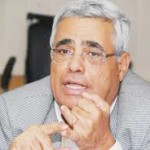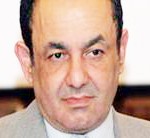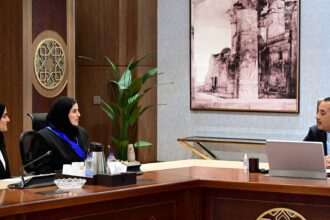Columnists are counting how many promises President Morsy has fulfilled, of the many he said he would meet within his first 100 days in office. Others are considering upcoming parliamentary elections, in particular the odds of success for Salafi former presidential candidate Hazem Abu Ismail and his new party. Finally, the ongoing saga of the Constituent Assembly is still filling column inches.
Worrying situations
Hassan Nafaa
Al-Masry Al-Youm newspaper
Recalling the decision of a number of members of the Constituent Assembly to return to the body after announcing their resignation, Nafaa argues the figures acted out of a desire to improve the final draft of the constitution. Other prominent members of the assembly, who mainly represent secular political movements, have been persistent regarding their withdrawal, justifying their decision with the dire need to have a national accord that spreads a sense of security within all segments of society while drafting Egypt’s most important document.
Citing an official statement issued by the returning members, the writer highlights their intentions to pull out again if the final outcome of the constitution writing process fails to meet the expectations of a new Egypt. This time, members have coordinated with various political powers to withdraw altogether from the body if the remaining members persist in inject their sometimes ultra-conservative views into the constitution.
One day after the members decided to return, Nafaa criticises the numerous political parties which called on fellow groups to withdraw from the body. The timing of such a decision worries the writer, who asks when will the Egyptian opposition put an end to their infighting and stop with the petty point scoring?
The 100-day promises…dreams or facts?
Amr Al-Shobaki
Al-Masry Al-Youm newspaper
It would be extremely unfair to compare President Morsy’s 100-day promises to those of any new president of a democratic country, states Al-Shobaki. The writer attempts to provide a comparative analysis between Morsy’s promises and those of the newly elected French president François Hollande. The writer cites the results on the Morsi Meter website, which has been monitoring and counting Morsy’s promises in his first 100 days of power, stating that only one promise out of eight in the field of general cleanliness has been implemented so far.
Similarly, only one promises out of 17 have been achieved in the field of security. As for the traffic dossier, again Morsy has only implemented one out of 21 vows. As the writer continues to list the minor achievements of Morsy, he turns his eyes to Hollande, who similarly has only partially fulfilled his campaign promises.
Finally, Al-Shobaki states that the situation in Egypt is getting more difficult when compared to any other democratic country, even if it belongs to the third world. The main challenge is that many of Morsy’s promises are not realistically capable of being met. The important lesson learnt is that Egyptian opposition should always think pragmatically of solutions before over expressing its dreams of change.
Hazem Abu Ismail’s political party
Emad Al-Din Hussein
Al-Shorouk newspaper
After a conversation with an assistant of Hazem Abu Ismail, the Salafi former presidential candidate, Hussein considers the likelihood of success for his new political party in the coming parliamentary elections.
The Salafi movement managed to win around a quarter of the seats in the former parliament. However, after the infighting within the salafi Al-Nour party, the writer anticipates that Abu Ismail’s voters could push his party to win at least 20 per cent of the seats in the coming People’s Assembly. If Abu Ismail’s party is granted an official license, Hussein argues it will be one of Egypt’s right-wing fascist parties.
The sheikh has charisma that led millions of Egyptians to vote for him during presidential elections, despite the controversial debate about the true nationality of his mother. Although many Egyptians oppose his ideology and ultra-conservative outlook, the writer believes that it is the duty of the entire population to support any political party that abides by the basic rules of laws and constitution.
Hussein says there is a need to establish strong political parties and coalitions in preparation for upcoming parliamentary elections. Enforcing transparent political rules and distancing religion from politics is the first light coming from the dark room of Egyptian polity, states Hussein.
The Ikhwanisation of the state and Islamisation of society
Al-Sayyed Yassin
Al-Watan newspaper
Phrases like “Ikhwanising” the state and “Islamising” society have become more than common in the context of Egyptian politics, argues Yassin. Harsh criticism of the Muslim Brotherhood may be justifiable if one observes the early steps of the Islamist group and its root plans to reach power. The writer recalls the Muslim Brotherhood’s negative influence on voters’ behaviour during the public referendum on the constitution amendments in March 2011.
Voting ‘yes’ was an absolute sign of being religious, whereas those who noted ‘no’ were labeled as liberal infidels, in Yassin’s view. While preparing for parliamentary elections, Salafi figures appeared up to describe the process as “the battle of ballot boxes,” as if elections had turned into an Islamist versus non-Islamist struggle.
The writer notes that the term “Islamising” the state started to be used during the formation of the Constituent Assembly and the Islamist domination of its infrastructure. Although the first body was legally dissolved, Yassin believes that the second assembly did not also represent a balanced mixture of Egyptian society. He states that after the success of President Morsy in the presidential elections, the process of “Ikhwanising” the state can be seen in a number of decisions.
One of the clearest examples was appointing Islamist figures as members of the High Council of Journalism and the National Council for Human Rights. “Ikhwanising” the state has even reached fundamental institutions like the military and the judiciary, which entails a gradual transformation of the country into a Muslim Brotherhood entity. Yassin states that this direction is far from following the path to a true democratic state.






